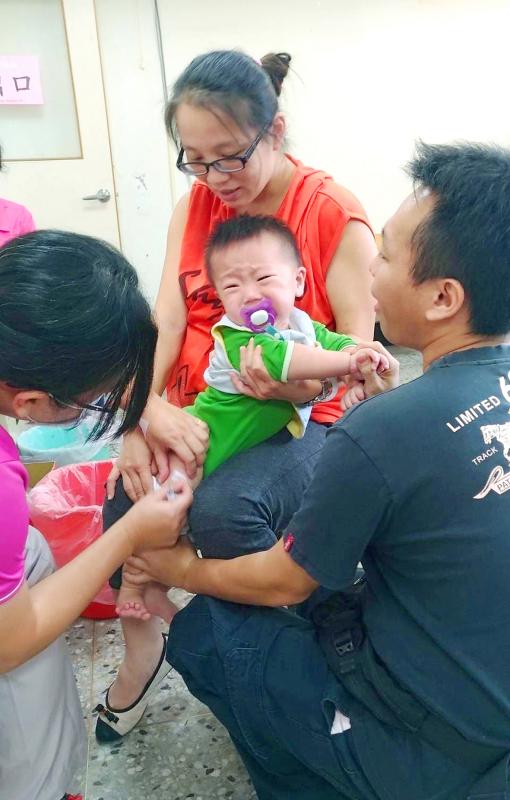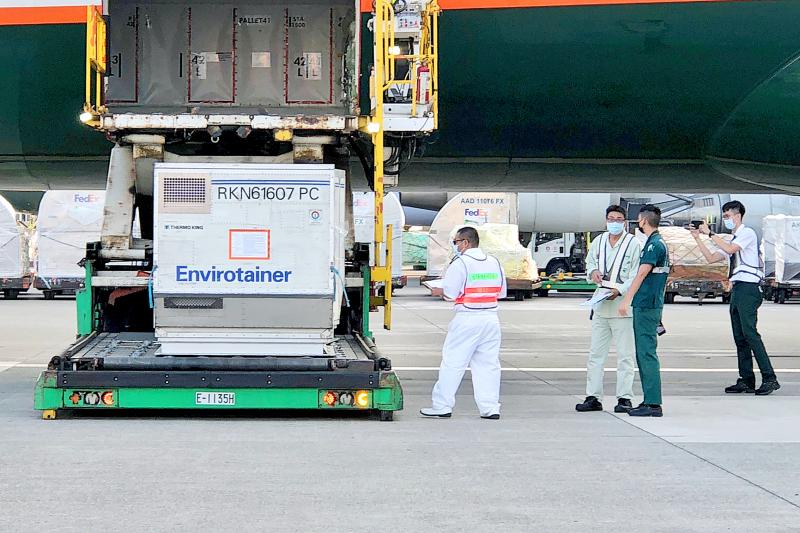This year’s government-funded seasonal influenza vaccine program would be carried out in two phases, with 11 groups of people eligible in the first phase, which begins on Friday, the Central Epidemic Command Center (CECC) said yesterday.
The vaccines would first be offered to people at higher risk of infection or serious flu complications, as well as those who are in need of more protection, said Minister of Health and Welfare Chen Shih-chung (陳時中), who heads the center.
Eligible recipients include healthcare workers and disease prevention personnel; people aged 65 or older; daycare or long-term care facility residents and workers; children between six months old and elementary school age; pregnant women; and parents of children younger than six months.

Photo: Tsai Shu-yuan, Liberty Times
Eligibility also covers people with underlying health conditions and chronic disease; people with a body mass index of 30 or above; those with rare disease or catastrophic illness; preschool or infant care facility workers; livestock and poultry industry workers and animal disease prevention personnel; and elementary school, junior-high school and high-school (or grade one to three of five-year junior college) students.
The second phase would begin on Nov. 15 and eligibility would be expanded to people aged 50 to 64 without high-risk chronic disease, Chen said.
A total of 6.32 million doses of government-funded flu vaccines would be offered this flu season while supplies last, he added.

Photo: CNA
Chen urged eligible recipients to book a vaccination appointment as early as possible starting from Friday.
People should wait for at least seven days between receiving a flu shot and a COVID-19 vaccine, and inform healthcare workers of any recent vaccination when receiving a flu shot, he said.
The Ministry of Health and Welfare’s Advisory Committee on Immunization Practices has said that spacing the flu shot and a COVID-19 vaccination would help healthcare workers better diagnose the source of any post-vaccination adverse events, the CECC said.
People can visit their local health department’s official Web sites, the Centers for Disease Control’s flu prevention Web site (https://antiflu.cdc.gov.tw) or its official Line account (疾管家) to find a contracted hospital or clinic to book a flu vaccination appointment, it said.
In other news, the CECC said a shipment of 160,000 doses of AstraZeneca PLC’s COVID-19 vaccine donated by Slovakia arrived in Taiwan yesterday.
Chen and CECC officials at a news briefing wore masks bearing the sentence “Thank you, Slovensko,” along with an illustration of a Formosan black bear holding the national flags of the Republic of China and Slovakia, and dianthus flowers and a rose to express the center’s gratitude.
Slovakia on July 16 announced its plan to donate 10,000 COVID-19 vaccine doses to Taiwan, and later increased the amount to 160,000 doses.
Chen said the vaccines that arrived yesterday expire between Oct. 31 and Nov. 30, and the center would arrange for people to receive a second dose of the AstraZeneca vaccine as soon as possible once the batch goes through lot-release testing.
Chen also announced that, starting on Wednesday, a total of about 1.11 million doses of the AstraZeneca vaccine would gradually be delivered to local governments to be administered to people aged 52 or older (born on or before Dec. 31, 1969) as their second dose.
Eligible recipients must have received the first dose of the AstraZeneca vaccine before July 22, or at least 10 weeks earlier, he said.
Local health departments would arrange the vaccination sessions and locations, and inform eligible recipients that they can receive their shots, he added.
Asked about a young man in Taichung who reportedly experienced myocarditis shortly after receiving the AstraZeneca vaccine, Chen said the case was reported as a post-vaccination adverse event, but further investigation is needed to clarify whether it was caused by the vaccine.
Centers for Disease Control Deputy Director-General Chuang Jen-hsiang (莊人祥), who is the CECC’s spokesman, said 17 cases of myocarditis have been reported following COVID-19 vaccination, and six of them had received the AstraZeneca vaccine, while the others had received the Moderna vaccine.

‘TAIWAN-FRIENDLY’: The last time the Web site fact sheet removed the lines on the US not supporting Taiwanese independence was during the Biden administration in 2022 The US Department of State has removed a statement on its Web site that it does not support Taiwanese independence, among changes that the Taiwanese government praised yesterday as supporting Taiwan. The Taiwan-US relations fact sheet, produced by the department’s Bureau of East Asian and Pacific Affairs, previously stated that the US opposes “any unilateral changes to the status quo from either side; we do not support Taiwan independence; and we expect cross-strait differences to be resolved by peaceful means.” In the updated version published on Thursday, the line stating that the US does not support Taiwanese independence had been removed. The updated

‘CORRECT IDENTIFICATION’: Beginning in May, Taiwanese married to Japanese can register their home country as Taiwan in their spouse’s family record, ‘Nikkei Asia’ said The government yesterday thanked Japan for revising rules that would allow Taiwanese nationals married to Japanese citizens to list their home country as “Taiwan” in the official family record database. At present, Taiwanese have to select “China.” Minister of Foreign Affairs Lin Chia-lung (林佳龍) said the new rule, set to be implemented in May, would now “correctly” identify Taiwanese in Japan and help protect their rights, the Ministry of Foreign Affairs said in a statement. The statement was released after Nikkei Asia reported the new policy earlier yesterday. The name and nationality of a non-Japanese person marrying a Japanese national is added to the

AT RISK: The council reiterated that people should seriously consider the necessity of visiting China, after Beijing passed 22 guidelines to punish ‘die-hard’ separatists The Mainland Affairs Council (MAC) has since Jan. 1 last year received 65 petitions regarding Taiwanese who were interrogated or detained in China, MAC Minister Chiu Chui-cheng (邱垂正) said yesterday. Fifty-two either went missing or had their personal freedoms restricted, with some put in criminal detention, while 13 were interrogated and temporarily detained, he said in a radio interview. On June 21 last year, China announced 22 guidelines to punish “die-hard Taiwanese independence separatists,” allowing Chinese courts to try people in absentia. The guidelines are uncivilized and inhumane, allowing Beijing to seize assets and issue the death penalty, with no regard for potential

‘UNITED FRONT’ FRONTS: Barring contact with Huaqiao and Jinan universities is needed to stop China targeting Taiwanese students, the education minister said Taiwan has blacklisted two Chinese universities from conducting academic exchange programs in the nation after reports that the institutes are arms of Beijing’s United Front Work Department, Minister of Education Cheng Ying-yao (鄭英耀) said in an exclusive interview with the Chinese-language Liberty Times (the Taipei Times’ sister paper) published yesterday. China’s Huaqiao University in Xiamen and Quanzhou, as well as Jinan University in Guangzhou, which have 600 and 1,500 Taiwanese on their rolls respectively, are under direct control of the Chinese government’s political warfare branch, Cheng said, citing reports by national security officials. A comprehensive ban on Taiwanese institutions collaborating or